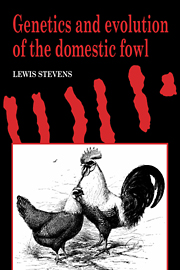Book contents
- Frontmatter
- Contents
- Preface
- 1 The history and evolution of the domestic fowl
- 2 The cellular organisation of genetic material
- 3 The transmission of inherited characters
- 4 Sex determination and sex-linked inheritance in the domestic fowl
- 5 Linkage and chromosome mapping
- 6 Genes controlling feathering and plumage colour
- 7 Muscle, nerve and skeleton
- 8 Lethal genes in domestic fowl
- 9 Quantitative genetics
- 10 Protein evolution and polymorphism
- 11 Immunogenetics of the domestic fowl
- 12 Gene cloning, sequencing and transfer in the domestic fowl
- APPENDIX I Linkage groups and the chromosome map in the domestic fowl
- APPENDIX II Oncogenes
- APPENDIX III The Chi squared (χ2) test
- APPENDIX IV One letter amino acid code
- APPENDIX V The genetic code
- Glossary
- Index
11 - Immunogenetics of the domestic fowl
Published online by Cambridge University Press: 22 September 2009
- Frontmatter
- Contents
- Preface
- 1 The history and evolution of the domestic fowl
- 2 The cellular organisation of genetic material
- 3 The transmission of inherited characters
- 4 Sex determination and sex-linked inheritance in the domestic fowl
- 5 Linkage and chromosome mapping
- 6 Genes controlling feathering and plumage colour
- 7 Muscle, nerve and skeleton
- 8 Lethal genes in domestic fowl
- 9 Quantitative genetics
- 10 Protein evolution and polymorphism
- 11 Immunogenetics of the domestic fowl
- 12 Gene cloning, sequencing and transfer in the domestic fowl
- APPENDIX I Linkage groups and the chromosome map in the domestic fowl
- APPENDIX II Oncogenes
- APPENDIX III The Chi squared (χ2) test
- APPENDIX IV One letter amino acid code
- APPENDIX V The genetic code
- Glossary
- Index
Summary
Introduction
Antibodies that make up part of the major defence system of the body, differ from the proteins discussed in the previous chapter in that the particular set of antibodies possessed by an individual is unique, and depends in part on the antigens with which the individual has been challenged during its lifetime. A process of selection occurs during the lifetime of the organism, but that does not imply that immunoglobulins (the antibodies) as a class have not evolved as with other proteins. The various types of immunoglobulins and their mechanisms of action have evolved over millions of years and collectively have the potential to combat a large range of antigens.
Before discussing the evolution and genetics of the immune system it will be necessary to outline the salient features of the system in general, and that of the fowl in particular. Immunogenetics is a subject that has developed greatly following the recent technical advances in the molecular biology of nucleic acids (see Chapter 12). Thus it has been possible to test the theories concerning the origin of antibody diversity proposed in the 1950s, since a number of gene sequences for immunoglobulins have become known (Porter, 1973).
Three separate areas are discussed in this chapter: (i) the genetics of antibody formation and the immune response, (ii) the Major Histocompatibility Complex (MHC), and (iii) the blood group antigens.
- Type
- Chapter
- Information
- Genetics and Evolution of the Domestic Fowl , pp. 208 - 236Publisher: Cambridge University PressPrint publication year: 1991



